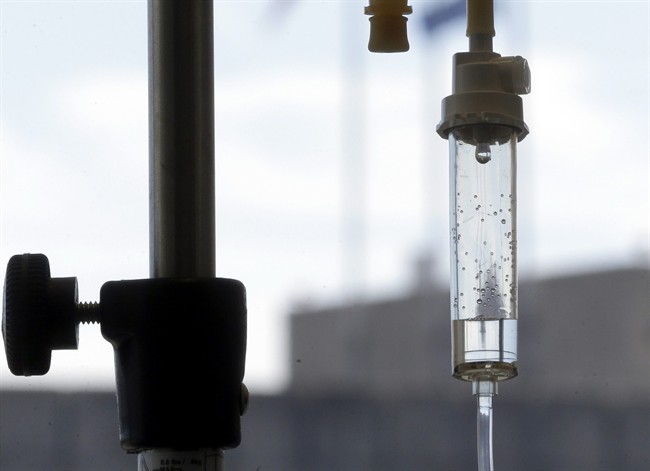TORONTO – Just weeks after sending in her college applications, Adriana Lombardo received the diagnosis that changed her life.

It was Dec. 1, 2014. That morning at soccer tryouts, Lombardo collapsed while running laps.
“I couldn’t breathe, my lips turned blue, my face was pale and I had to stop running because my legs went numb,” Lombardo told Global News.
The 17-year-old high school senior was diagnosed with acute lymphoblastic leukemia. The healthy, active teen could never have guess she’d face this diagnosis.
“I was screaming, I was so upset,” Lombardo said. Two days after her diagnosis, she was already a chemotherapy patient in hospital.
Feb. 4 is World Cancer Day, in which health officials around the world shine a light on the disease. In 2014, it was estimated that 22 Canadians were diagnosed with cancer every hour.
READ MORE: Canadian doctors dispel cancer myths to mark World Cancer Day
This year, Canadian doctors at the Princess Margaret Cancer Centre are zeroing in on adolescents and teens grappling with cancer.
Dr. Abha Gupta, medical director of the cancer centre’s adolescent and young adult oncology program, says that this group is often overlooked. She says there is emphasis on pediatric care for infants with cancer and plenty of resources for adults, but those in between have their own set of needs, too.
“Having cancer in your adolescent years or as a young adult occurs at a time when you’re dealing with so much else in your life. School, family, friends, sexuality – you’re trying to figure yourself out as an individual and you’re dealing with this whole new hurdle with cancer,” Gupta told Global News.
There are concerns that resonate more with this group than other age groups battling cancer. Preserving fertility is a common discussion for young adults. Body image is also a worry – while trying to establish confidence as a growing teen, patients often lose their hair, or even need major operations to their arms and legs that could affect mobility.
There’s also social isolation, Gupta says.
“Most people don’t have friends who have gone through cancer and it can be extremely isolating. It’s hard to explain what you’re going through and what it feels like,” she explained. Her program is working on bringing together survivors via social networking.
READ MORE: What do kids, adults know about cancer?
Lombardo had a trying few months: the chemotherapy sapped away her energy, appetite and day-to-day plans. The determined teen concedes that she likes to be in control of her life – cancer didn’t necessarily change that.
“I can’t control how I feel with energy levels but this hair thing I can control. I can say when it’s going to fall out, I didn’t want it to be a traumatic experience,” she said.
The brave teen shaved her head. “It was a little overwhelming. I accepted it because for me it was putting it in my own hands. It was empowering and showed how much stronger this whole situation is making me,” Lombardo said.
Lombardo said that encountering cancer at a young age had its silver lining. Now that she’s in remission, she savours each precious day of life.
“You don’t realize how much you appreciate life and you take advantage of the little things. I have a better head on my shoulders and when I grow up I won’t take advantage of these little things,” she said.
Gupta echoed Lombardo’s sentiments. She said that research has found similar findings: cancer survivors often adopt a confident, can-do outlook on life.
READ MORE: How healthy is your city? 7 findings about Canada’s best and worst cancer-fighting cities
“You fought the biggest battle in your life so anything else that comes towards you seems possible to handle. Smaller things don’t seem so monumental, people come out at the other end much more confident, secure and powerful,” Gupta said.
What brought Lombardo the most comfort was her family and friends. While they may not have dealt with the cancer firsthand, they worked through Lombardo’s highs and lows.
“They understand that I have crazy fluctuations in energy. There are some days where I sit in silence and other days that I want to sit and laugh about nothing. They had the patience to go through it with me,” Lombardo said.
She turns 18 in March, will be graduating with her class in the Spring and has already been accepted to the colleges she applied to.




Comments